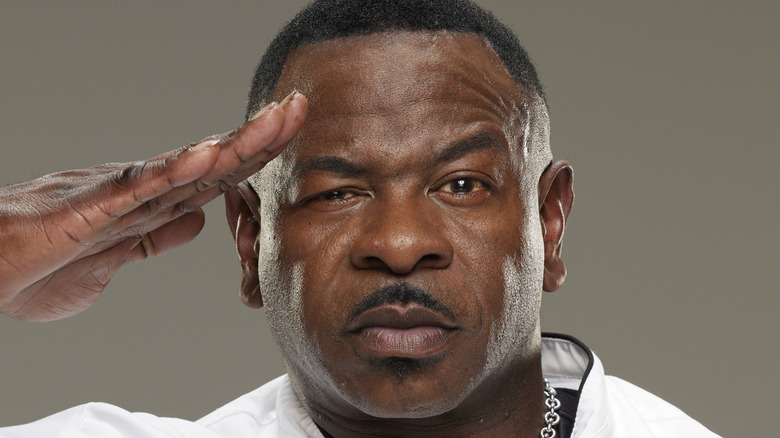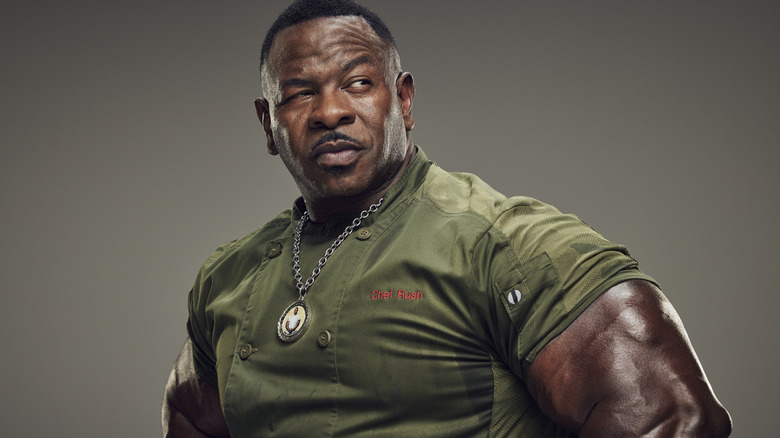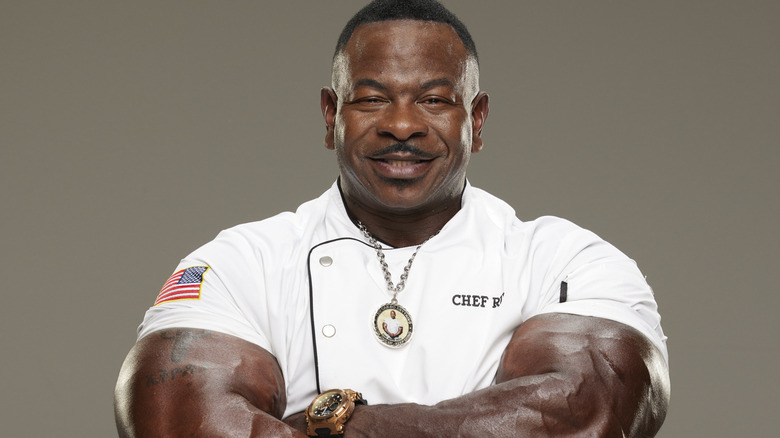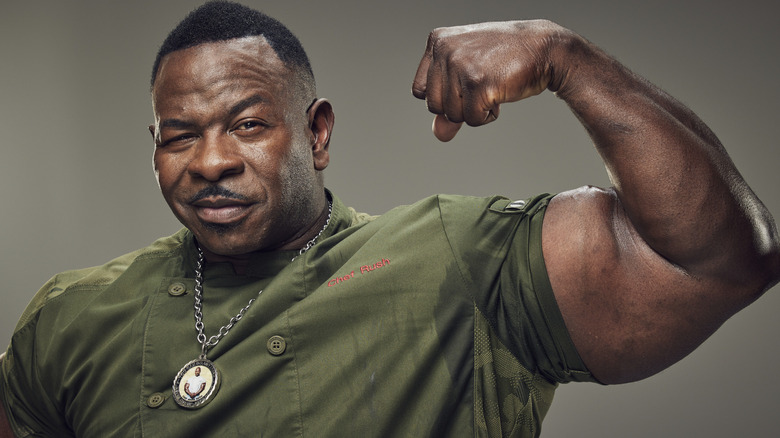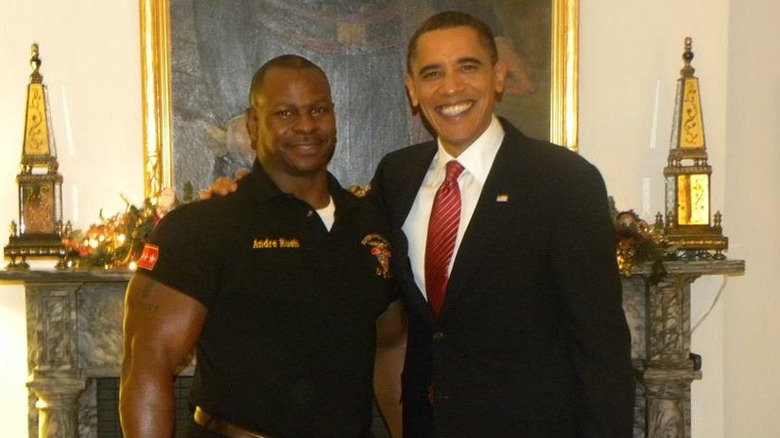Former White House Chef Andre Rush Gives All The Details About His New Series - Exclusive Interview
As an army veteran who has worked as a White House chef for multiple presidents, Andre Rush knows how to thrive under pressure — in fact, he excels at it. This is likely the perseverance that Gordon Ramsay saw in him when he knew Rush would be the perfect fit to helm his own show on Ramsay's network. The fitness advocate, who's known for his giant, 24-inch biceps, told us in an exclusive interview that his new series, "Kitchen Commando," will help get struggling restaurants back in shape and reignite their passion for the service industry.
In a trailer for the show, Ramsay admits that the Bronze Star Medal recipient won't be "taking any prisoners," and Rush revealed that he's even tougher on participants than the "Hell's Kitchen" host is. The Mississippi native explained that despite the different adversities he's had to overcome, he always remains focused because he knows how quickly things can change or be taken away. Rush has been open about being at the Pentagon on 9/11 and how he still works through PTSD from that horrific day. The "Call Me Chef, Dammit!" author said that because of this, he uses tough love to work with the staff at these restaurants on their physical strength, financial issues, and mental health.
What audiences can expect to see on Kitchen Commando
Congratulations on your new show! Did Gordon Ramsay reach out to you personally to join his new network?
Thank you. He actually did. I've been a big fan of Chef Ramsay for a very long time and admire what he does, from the aggressive side to the caring side to the funny side, which is kind of like my nature as well. Energy feeds energy, and one day we collided together, and voila, here we are.
Ramsay can be a tough critic, but he said that after spending time with you he knows how dedicated you are to the food world and that your "story is an inspiration to any chef." What does it feel like to get that kind of praise from him?
It was extremely humbling. You do what you do naturally, organically, and you don't try to please anyone but yourself. I say to people, "You're your biggest and greatest worth." I'm my biggest critic. I don't waver on service. I don't care if it's the president or if it's the homeless; I treat them all the same. But at the same time, to hear him say things like that — it drives me. It gives me that intentional fortitude to push harder, be stronger, and do my best, not only for myself but for him and the team that believes in me.
Can you tell me a little more about what viewers can expect to see on "Kitchen Commando"?
I'll be honest with you: It's like a whirlwind. You won't expect what's coming on each episode. If you think Chef Ramsay is a little tough, I make him look like a baby a little bit. I do tough love but also compassion. One of the things that I do is bring in a military mindset. I want people to forget about the food as a primary and think about service and [them]selves and their employees and their community and everything. Each episode has something to give back.
You do some food, do some revamp, but at the same time, I want them to lead with that peace of mind, which is [the] mental health [and] wellness [that comes from] doing something that's great. [It's] not only thinking about trying to sell food for money, but selling their heart and their souls and everything that goes along with it. That was important to me, to put that message out, and I was extremely grateful that they let me organically do that how I always do. It's going to be a fun, different type of show.
Why he believes some restaurants struggle financially
The description of the series says you'll be working with struggling restaurants. Was there one that stood out to you while filming?
There [were] a few that stood out, but one that stood out even more so because it was all over the place was Crab Boss, his and hers. There was a lot that stood out about that.
Some were very, very different. Even the ones that [weren't] struggling as much had some internal issues as far as that peace of mind, being together with family. Some of these guys have their whole family in there. I found out a lot of the [owners of the] restaurants had their wives and their kids in there, and they had no personal life. They had no social life, and all the love was going [away]. So I addressed all those issues as well.
What do you think it takes to get a restaurant that's fallen on hard times profitable again?
They need to think outside of the box. Sometimes when restaurants fall on hard times, there's a reason why: complacency. They assume it's going to always be there. Nobody expected a pandemic to happen. Thirty percent of restaurants here in LA went kaput. That was their livelihoods. Think about it: That's an extraordinary number. So I tell people, every day is the first day. You have to keep practicing. You have to keep focused on this. You have to keep marketing and doing things — don't become complacent.
We always think, "I'll never go anywhere." But something may happen where you have no choice. And [the pandemic was] one of those times where people didn't have [a] choice. But at the same time, you have to stop. You have to think, "What can I do? What can I do to make it better?" instead of just saying, "I give up, I give up, I give up." A lot of them just said that, but they were thinking the exact same way from day one 'til that happened.
Was there any moment during the season that surprised you?
Every moment. The craziest thing about this was that every restaurant was a vastly different restaurant: the people, the culture, the nature, the service, the food, everything. It was surprising on every level. Some things you would think of as common sense or ... I got surprised a lot.
How fitness will be incorporated into the show
Fitness is a big part of your life. Will that be incorporated into "Kitchen Commando"?
Yeah, of course. That's part of it. I do a lot of pushups, and that's one of my P's out of the four P's — push. I'm going to push them to push me to push each other. We push together, and we literally push. Fitness is a big part of it, especially if you're in a restaurant working 12, 14, 15, 16 hours a day.
Some of the guys are overweight and they make excuses. In one episode, literally, the whole family had [had] heart attacks or strokes, and they were in a restaurant eating [food that made them] prone [to] that, and they just made excuses. I was like, "There's no excuses for you to be in this situation where you can almost lose your lives." As a matter of fact, one guy had a heart attack a month before we got there.
So do you have them do pushups or a physical regimen?
We do. Maybe a couple of pushups in there.
When someone is feeling burnt out in the service industry, how do you help to reignite their passion?
It could be mental health, it could be family, it could be the job itself, it could be the lack of passion, and so forth. You got to rekindle that passion they have, like a fuse on a light switch — just put that together and let them realize their worth and their value. I always let people know how valuable they are, no matter if they're the dishwasher, the main head cook, or the owner. Everybody has a job, no matter what it is. They're equally valued in their job, and that means a lot.
[In] one of the episodes, a dishwasher was on top of it because all the dishes were going. I'm like, "He's the hero today." He did everything. They did it right. And you saw the glow on his face, just by saying that, because he thought he was an afterthought. No, everybody has their job and everybody does it diligently. You got to make people realize, "Let's get back together and do this as a team," because energy feeds energy, and once you get that one person, it spreads like wildfire.
Did you ever feel burnt out or overwhelmed while serving as a chef at the White House for multiple presidents?
Overwhelmed, no. Burnt out, no. I'll be honest with you: I look in the mirror every day, and I do this coin, which is the challenge coin, and I say, "You can do anything. Never give up. Keep going." [That's] what my mother always said to me, which is on my coin, so every morning I look in the mirror and say, "You got this. You can do this." We can be our greatest asset and value, or we can be our worst enemy. A lot of times, it's just us against us.
How working at the White House prepared him for his new series
How do you think your time at the White House prepared you for a show like this?
Everything was so diverse. [It helped me understand] different types of people, cultures, and relationships. In the White House and some of the places I've served, you have to know etiquette, religion, serving from the left and right, doing this, saying certain things, being certain ways. Everybody's different, and they take it for granted. You can't do that. You can't say that. Multitasking on all those levels [is] extraordinary, and it's a necessity when you're dealing with so many different cultures or people or organizations, especially in the food industry.
What are the similarities between developing a menu for the White House, the military, and a restaurant?
You have to focus on your audience. Take your personal things out of consideration. If you like fried baloney, everybody else may not like it. But if you can [find something that] everybody else loves, then think about that. Don't be conceited [and] say, "My way is the only way." Look at your audience and make a medium where you can feed everyone and make everyone happy.
If you have all Southern people or all Indonesian people or Indian people, you can't introduce them to certain things. You got to tiptoe along with it and test the waters for it. There's no problem with taking pride in what you do, but you also got to make sure that it's going to go [over well] with everyone else. You can't make a number 10 hot spiced food for everybody's sensitive palate [if] yours is the only one that can stand it.
What is the biggest lesson you learned during your time in the military and cooking for the White House that you'll apply with "Kitchen Commando"?
What's my biggest lesson from the military? My drive. I keep saying it over and over again: complacency. Don't relax. One of the things my dad taught me at a young age, which I thought [at first] was very negative, but it's a very positive saying, [is], "Wherever you go, someone wants you to fail." It doesn't matter. They can be the person talking to you, the person behind you, with you, whatever. It doesn't matter because they can be patting you on your back and be your greatest ally, but internally, they want you to fail because they want to be where you are.
So keep driving, keep doing what you're doing, and never waver on your service. Do everything you do like it's the first day. Every day is the first day. That's what I always tell all my guys.
"Kitchen Commando" premieres February 12 on Tubi and will run new episodes every Sunday through April.
This interview has been edited for clarity.
